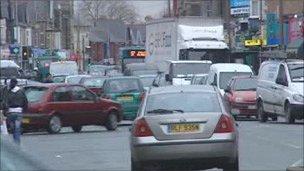Cardiff Civic Society in congestion charge plan
- Published

The vision for Cardiff transport looks ahead 15 years
Plans for an integrated transport system in Cardiff, which could include a congestion charge by 2026, have received a mixed reception.
Cardiff Civic Society's plans include a Metro-style railway, an all-Wales rail franchise and an orbital road.
David Hughes-Lewis of Cardiff Retail Partnership said congestion charging was "almost inevitable".
Council leader Rodney Berman said the plans were potentially a disaster for Cardiff's economic viability.
Cardiff Civic Society is a registered charity set up to promote civic pride and high standards of planning, architecture and environment in the capital.
Its scheme, which also suggests greater use of park-and-ride schemes, and better co-ordination of bus, cycle and train routes, is a response to Cardiff council's own local development plan.
Both will be considered by the Welsh assembly's planning committee, when it reforms after the election.
Peter Cox, chair of the society, said that if current trends of car usage in Cardiff continued, by 2026 the city's roads would be gridlocked.
"Anyone who's ever tried to travel from one end of Cardiff to the other at four in the afternoon could tell you that's true," he said.
"Obviously that would have a catastrophic effect on our air quality, and would leave Cardiff's stated ambition of being a carbon-free city dead in the water.
"But much more than that - financially, politically, socially, industrially - Cardiff would be choked, and unable to function as Wales' capital."
Mr Cox said the future development of the city was "far too big a decision for Rodney Berman or Cardiff council to take unilaterally."
"Cardiff is a regional and national hub, and therefore there needs to be involvement from the Welsh Assembly Government, from Westminster and from everyone in Wales."
'Fanciful'
Mr Berman, Cardiff council leader, described the plans as "at best fanciful, but at worst a disaster for the economic viability of the city centre".
Motoring campaigner and journalist Mark James gave the plans a cautious welcome.
"It might just work, providing the congestion charge comes after the rest of it," he said.
"No-one likes being stuck in a traffic jam, we all want cleaner air, and - by and large - drivers don't mind paying their fair share.
"What they don't want is a money-making scheme which will hold them to ransom with no real alternative to using their car; being given hollow promises of jam tomorrow."
Gordon James, director of Friends of The Earth Cymru, said the scheme would have to get widescale public backing.
"If it didn't there wouldn't be a council or government in the land who'd risk their own seats by forcing it through," he said.
Mr James said the way to get such consensus was to show people they would be offered genuine, reliable and affordable alternatives.
"If people are charged for driving into Cardiff, they need to see proof that their money is actually being used to improve transport infrastructure, and not disappearing into a financial black hole," he said.
"Things like the light railway and orbital road will obviously take years, but park-and-ride schemes, and better co-ordination of bus, cycle and train routes could be done much more quickly."
- Published12 April 2011